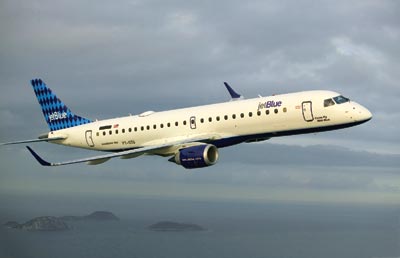
Airline Price Doesn't Equate With Quality
According to consumers, the price of an airline ticket doesn't necessarily equate with the quality of the flight.
For the third consecutive year, Jet Blue Airways was ranked as the best-performing airline in the 2005 Airline Quality Rating study. The study examined consumer feedback from the 17 largest airlines; those that performed best were low-fare carriers. Following Jet Blue in the top five of the AQR are AirTran, Independence Air, Southwest and United.
The rating is conducted annually by the University of Nebraska at Omaha Aviation Institute and the W. Frank Barton School of Business at Wichita State University. It uses 15 elements important to consumers to judge the quality of airline services, such as baggage handling, on-time arrivals, denied boarding and customer complaints.
While low-cost carriers fared well in the survey, researchers also found that consumer scores overall were the lowest they've been in five years. All of the carriers in the survey performed poorly in baggage handling, and just five of the 17 carriers had on-time boardings of more than 80 percent. Customer complaints were 17-percent higher in 2005 than they were in 2004. The report also notes the following: SkyWest had the best on-time performance for 2005, Jet Blue had the lowest denied-boarding rate, AirTran had the best baggage-handling rates and Southwest Airlines had the lowest
consumer-complaint rate.
The ratings were as follows: Jet Blue, AirTran, Independence Air, Southwest, United, America West, Northwest, Continental, Alaska, American, ATA, Delta, SkyWest, American Eagle, US Airways, Comair and Atlantic Southeast.
Other findings of the research include:
• Industry performance in each of the four AQR criteria--on-time performance, denied boardings, mishandled baggage and consumer complaints--was worse in 2005 than 2004.
• The only airline to show improvement in its AQR score in 2005 was Comair, which finished second-to-last in the overall rating.
• Seven airlines improved their on-time arrival performance for 2005.
• The consumer-complaint rate was higher for 14 of the 16 airlines rated in 2004 and 2005.
"At a time when the airlines got worse, they all kind of got worse at the same rate," says Dean Headley, associate professor of marketing at Wichita State University and one of the study's researchers. "If we continue down this path, consumers will lose all confidence in the airlines' ability to perform."
Renowned consultant H. James Harrington, president and CEO of Harrington Institute Inc. and a Quality Digest columnist, agrees. He observes that U.S. airlines' staff reductions and cuts in employee retirement benefits haven't worked to improve their profitability. Instead, they've caused customer satisfaction to plummet--even as carriers in other parts of the world are growing and prospering.
"U.S. carriers are making the skies more unfriendly with cuts in staff, cuts in pay and doing away with already-earned retirement benefits," Harrington says. "There has to be a better way and we in the United States need to find it soon."
For more information, visit www.aqr.aero.
Baldrige Pilot Deadline Approaches
Nonprofit organizations interested in applying to be part of a pilot Baldrige Award program have until May 25 to submit their applications.
The National Institute for Standards and Technology, which administers the Baldrige Award, will accept applications from nonprofits that have received a top-level award from a state or local quality award program, and that would be eligible to apply for a Baldrige Award in the nonprofit category in 2007. Although no awards will be presented to the organizations participating in the pilot phase, they will receive written feedback from a team of private-sector examiners.
For more information, visit www.baldrige.nist.gov.
 Update: 3M Age Discrimination Lawsuit Expands Update: 3M Age Discrimination Lawsuit Expands
A lawsuit alleging that manufacturing giant 3M Co. illegally discriminates against its older workers by, among other offenses, denying them Six Sigma training, has expanded to include six plaintiffs.
Quality Digest first reported this story in February 2005 (see www.qualitydigest.com/feb05/news.shtml#1), two months after Michael V. Mucci, 56, and Clifford L. Whitaker, 62, filed suit against the company. At issue is 3M's intricate set of personnel rules, promotions evaluations and quality training, which the plaintiffs allege is set up to favor younger workers. While both Mucci and Whitaker have had some Six Sigma training (according to their lawyer, Mucci is a Green Belt and Whitaker has received Design for Six Sigma training), they claim that hundreds of their less-qualified younger colleagues were chosen for further training--as Black Belts and Master Black Belts.
Four additional plaintiffs, Robert W. Coats, 60, Rosemary J. Sterrett, 58, Mark D. Swanson, 54, and Thomas R. Bulen, 54, were added to the lawsuit in February of this year. As a class-action case, it has been filed on behalf of "all others similarly situated"--meaning it could apply to upward of 7,000 current and former 3M workers, says attorney Susan Coler, who represents the plaintiffs. It is being argued in Minnesota, where 3M has its headquarters, in New Jersey, and in federal court through the Equal Employment Opportunity Commission.
According to its Web site, 3M started using Six Sigma's statistical analysis tools in 1995 and implemented the methodology companywide in 2001. 3M reports that it has trained more than 30,000 employees in Six Sigma skills, and that it planned to train all its salaried employees as Six Sigma Green Belts by the end of 2004. According to 3M literature, the company has closed 11,000 Six Sigma projects and has another 12,000 underway.
Coler reports that she has received many calls from other prospective plaintiffs, and that her firm is still interviewing them. The case is currently in the discovery phase, and Coler reports that she doesn't expect to go to trial until the middle of next year--at the earliest.
"We're not going to drop this issue," she says. "It's a very strong case, and we'll take it as far as we have to."
3M refused to comment.
For more information, visit www.minnesotaclassaction.com.
 Measuring Success: CMSC 2006 Measuring Success: CMSC 2006
Metrology experts, educators and apprentices from around the world will gather at the 22nd annual Coordinate Metrology Systems Conference from July 17-21, 2006, at the Doubletree Hotel in Orlando, Florida.
CMSC 2006 is the only North American conference dedicated solely to those responsible for factory-floor measurement and inspection of manufactured and assembled components. This year's program focuses on what's hot in the world of industrial measurement applications and trends, including expert white paper presentations and a series of CMSC workshops such as "Reverse Engineering 102," "3-D Metrology Interoperability" and "Managing a Dimensional Metrology Organization." The CMSC exhibitor hall will showcase service providers and manufacturers of high-precision portable coordinate measuring machine (PCMM) systems, software and peripherals.
The CMSC Society, the eminent membership association for 3-D measurement professionals, hosts this popular event each year. Conference attendees come from prominent science and research laboratories, and diverse industries such as aerospace, space hardware, antenna, automotive, shipbuilding, power generation and general engineering.
To register for this conference visit www.cmsc.org.
 ISO Helps SMEs ISO Helps SMEs
The International Organization for Standardization recently opened a new section on its Web site to help small and medium-sized enterprises (SME) achieve the benefits of standardization.
The materials and articles address the benefits of registration to ISO 9001 and ISO 14001, and include implementation tips. "SMEs may mistakenly perceive of international standards as being only for big business and government," says Alan Bryden, ISO secretary-general. "In fact, SMEs too can benefit from the state-of-the-art technology and management practices disseminated by international standards, which also open the door to export markets and participation in global supply chains."
Topics available include "Taking the First Steps Toward a Quality Management System," "Taking the First Steps in Environmental Management," "Quality Management Consultants: Instructions for Use," and "Implementing ISO 14001: Do You Hire a Consultant or Do It Yourself?"
Consistent with this effort, the use of ISO 9001 and ISO 14001 in smaller organizations will be the theme for World Standards Day, which will be recognized globally on Oct. 14.
For more information, visit www.iso.org.
Gas Pains
The International Organization for Standardization recently published a new standard designed for the assessment and reduction of greenhouse gases.
ISO 14064 has been under development since 2002. It's offered as a solution to the problems posed by governments and businesses that have used varying approaches to assess greenhouse gas (GHG) production and removal. The standard is the product of three years of work, and it includes insights from 175 international experts from 45 countries and 11 international businesses.
"ISO's goal is to provide a set of unambiguous and verifiable requirements or specifications to support organizations and proponents of GHG reduction projects," says Chan Kook Weng, convener of the ISO working group that developed the standard. "ISO 14064 will provide clarity and consistency between those reporting GHG emissions and stakeholders."
The standard includes three parts and will be complemented by ISO 14065, which will specify requirements to accredit or otherwise recognize bodies that undertake GHG validation or verification using ISO 14064 or other relevant standards. ISO 14065 is expected to be published in early 2007.
For more information, visit www.iso.org.
Hazardous-Substance-Free Symposium Announced
An upcoming symposium will offer attendees a unique environment to learn about the production of hazardous-substance-free (HSF) products.
HSPM2006 International Leadership Symposium for Hazardous Substance Process Management will include a thorough overview of QC 080000 IECQ HSPM, a recently released international specification that addresses new requirements in countries all over the world (such as RoHS in Europe and Articles 11 and 12 in China) prohibiting hazardous substances in exported electronic products and components. Industry leaders, executives of multinational companies and representatives from companies of all sizes are expected to attend to hear about the implementation of HSF requirements.
Dave Smith, chairman of the International Electrotechnical Commission Quality Assessment System for Electronic Components, will be the keynote speaker. Additional presenters will speak on such topics as "Overcoming Resistance to Change on the Way to HSF," "The Impact of HSF on Distribution," and "Taking the Lead Out of Solder."
The symposium will be held June 5-6 at the San Francisco Airport Marriott in Burlingame, California. The Salot Bradley Group International is hosting the event.
For more information, visit online at www.hspmsymposium.com.
U.S. Lags in Social Responsibility
A poll performed by the American Society for Quality found that while 96 percent of respondents think that their companies' corporate stance toward social responsibility will greatly affect the United States' economic future, more than 40 percent of them still don't have a policy in place that addresses the issue.
ASQ conducted the poll in preparation for its development of a global social responsibility standard. In the wake of recent and ongoing corporate scandals, environmental disasters, child-labor violations and dangerous work environments, the voluntary standard will provide consistent principles and direction for an organization's commitment to social responsibility. Experts from the public and private sectors are invited to join the team that will develop the standard.
"It's clear that the choices we make today to ensure a more ethical work and living environment will certainly have a major impact tomorrow," says Paul Borawski, ASQ executive director and chief strategic officer. "There could not be a more timely opportunity for organizations to join together and make their voices heard about the issue of social responsibility."
Other results of the poll include:
• The "Enron Effect" may be at work, as 70 percent of respondents that implemented a social responsibility policy said they did so in 2001 or later--timing that followed the publicity surrounding the Enron scandal.
• Two-thirds of business leaders say the No. 1 reason they would implement a social responsibility policy would be to maintain their brand image. This is followed closely by enhancing employee morale and reducing legal liability.
The new standard is targeted for publication in the fourth quarter of 2008. For more information, visit www.asq.org.
Chinese Survey Service Quality
The Qingpu district of Shanghai recently commissioned the Shanghai Association for Quality to perform a public-satisfaction survey on the quality of service the local government provides.
The survey will be performed by SAQ's Customer Evaluation Center, and the results of the poll will examine the performance of 59 local government departments. SAQ reports that district officials hope to transform the district's governmental functions to reflect a new focus on market supervision, economic adjustment and public service.
The survey is part of an improvement process to make the district more receptive to the public. The district has already streamlined its administrative fee and approval processes. It has also reduced the number of items requiring district approval or verification from 1,104 to 550.
Quality in Uzbekistan
A historic meeting was held recently in Uzbekistan, and it had nothing to do with the United Nations or any governmental body.
March 17 marked the first anniversary of the formation of the Quality Managers Club, a growing group made up of Uzbek quality professionals. The group was formed by TÜV Academy and several consulting companies in Uzbekistan, which observed Uzbekistan's potential to make headway in international business by becoming a destination for offshoring. Uzbekistan is one of the world's largest exporters of cotton and a major producer of gold. It also has substantial deposits of copper, minerals, natural gas and oil.
To date, though, the implementation of international standards hasn't been widespread in this central-Asian country. The formation of the Quality Manager's Club is a testament to the country's new interest in quality principles. Currently, approximately 60 of Uzbekistan's leading companies have implemented International Organization for Standardization standards, and there are eight consulting companies that specialize in quality and standardization operating there.
March's anniversary meeting of the Quality Managers Club was held at the International Business Centre, and focused on the role and responsibilities of managers in ISO 9001 compliance. In addition, the Best Manager of 2005 award was presented.
Errata
A chart that was included in an article in March's Quality Digest ("The Six Sigma Cure," Laura Smith) mistakenly reported that Zithromax is a painkiller. In fact, Zithromax is an antibiotic. In addition, Furosemide was identified as a painkiller; it is actually a diuretic.
We apologize for the errors. |